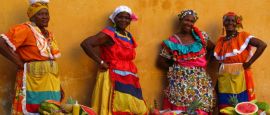Colombia: Doing business & staying in touch
Doing business in Colombia
Latin Americans take care over their clothes and overall appearance, and those doing business in Colombia are advised to do the same. A business trip that spans several days is likely to include an invitation for drinks or dinner. Many Colombian businesspeople speak English but any effort to speak Spanish is greatly appreciated. The Colombian Ministry of Foreign Affairs has an official translation service, and there are a number of commercial interpreter services. The best months for business visits to Colombia are March to November. The business community generally takes holidays from September to February, the driest months. It is advisable to avoid Barranquilla in June and July.
Colombia is Latin America's fourth largest oil producer and a primary coal producer, leaving the country vulnerably to fluctuations in commodity prices. When oil prices fell in 2017, the country's economy slowed down accordingly. Apart from oil and coal, Colombia is the world's second largest cut flowers exporter and third largest coffee exporter.
Colombia is a founding member of the Pacific Alliance which is a regional trade block formed in 2012 by Chile, Colombia, Mexico, and Peru to promote regional trade and economic integration.
Keeping in Touch in Colombia
Most public telephones take phone cards, which you can buy in many shops and kiosks. Many internet cafés also have international phone booths, as well as Skype facilities.
Roaming agreements exist with a few international mobile phone companies. Coverage is limited to urban areas. If your phone is unlocked, you can buy a Colombian SIM card from companies such as Comcel, which will make calls and texts a lot cheaper. You may need identification for this.
There are internet cafés in most towns and cities. Most hotels and hostels in bigger cities provide free Wi-Fi, and the connection is usually quite good.
The postal service is not reliable, and travellers are advised to use couriers if sending important documents or packages. There are no traditional post offices, but hotels in major cities offer a postal service.
For many years Colombia was a dangerous place for journalists who faced intimidation by drug traffickers, guerrillas and paramilitary groups. In the 1990s, over 120 journalists were killed, many for investigating drug trafficking and corruption. Things have improved, and the law technically provides for freedom of the press, but there is still a long way to go.
The main papers are El País and El Tiempo; English-language papers are not prevalent. Colombia has five national TV channels: Caracol TV, RCN TV, Señal Colombia, Canal Institucional and Canal Uno. There are other local channels.








 You know where
You know where